Sign up to our newsletter
Sign up to our newsletter to receive regular emails with information about our recent programme updates, articles, and events.
To sign up, please complete the form below. By submitting your details you are agreeing to our privacy terms.
In this newsletter:
- Learn more about our attendance at the Public Sector Data and AI Forum.
- Read a recent article on the sustainability of AI research.
- An update on the outcomes of our user interviews, and
- Our recent environmental exposure and health workshop.
As always you can find DSH updates on Twitter and LinkedIn.

The DSH attends the Public Sector Data and AI Summit
The Public Sector Data and AI Summit took place at the end of February and explored the key issues that will affect the public sector and its services over the next decade – including the boom in Generative AI, how to build trust in AI and decision making and understanding how data can be harnessed to improve citizens’ lives.
Professor Dave Topping, Deputy Director at the DSH spoke to delegates at the Summit about how broad applications of AI can enable policymakers to make effective use of data in areas such as air quality and health through use of modelling techniques like digital twinning. Barriers to using data including access, findability, and technical expertise were also discussed.
Initiatives such as the Digital Solutions Hub will overcome the barriers outlined above and will enable policymakers to have easy access to trusted integrated datasets. The output will allow them to analyse and visualise data enabling informed decisions to be made at the health environment interface.
Click on the button below to access Professor Dave Topping’s presentation or read his article Data and Decision Making; how AI and data tools can help influence evidence-based policy change here.
Access the presentation.

Article: Prioritize environmental sustainability in use of AI and data science methods
- The leveraging of AI and data science could be the most effective way to make decisions in our ever changing world.
- However, consideration must be given to the energy requirements of these methods which will have an increasingly negative effect on the environment without sustainable design and use.
- This topic is explored by academics in a recent article shared by the Nature Geoscience Journal which outlined how the environment can set the standards for best practice in this arena.
- Click here to read the article that was contributed to by Professor Caroline Jay, Professor Dave Topping, Dr Scott Archer-Nicholls of the Digital Solutions Hub.

User interviews update
The Digital Solutions Hub programme does not conform to the ‘build it and they will come’ principle. Instead it has put its potential users at its core.
We hosted around 100 users of environmental data at our workshops which elicited 400 requirements for the Hub to meet.
Last winter we followed this up with 15 in-depth interviews to help in completing the vision on requirements for the different functionalities the DSH aims to host.
These include the type of search functionality users want (such as AI-powered search) and alignment to processes users need to access, validate and use different types of data.
The interviews also helped us to understand what users considered to be trustworthy and quality data.
Trustworthy data includes
- Data collected long-term by established programmes – “old data”
- Data of thorough provenance records – where does the data comes from? what is the expertise and experience of the provider?
- Data that meets ethical standards for data collection and sharing.
- Data from research groups with a consistent track record of producing data on a particular area.
- Data that has testimonials from those who have used it.
Quality data includes
- Data that provides the needed coverage – it aligns with the identified granularity preferences.
- Data that is complete, up to date and timely.
- Data that is correct, clean, with relevant and “tidy” content.
- Data that displays a high level of confidence and the user identifies is from a trusted source.
- Data that has reliable metadata which is captured and communicated.
A full analysis of the interviews and what the outcomes mean for the shaping of the Digital Solutions Hub will be available in a report to be released later this year.
In the interim, please do get in touch if your would like to know more about how the DSH might be able to support your organisation.
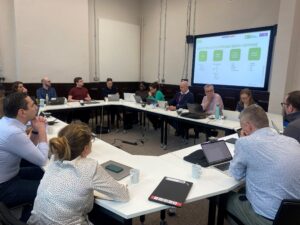
Our Environmental Exposure and Health Workshop
The Hub’s ability to integrate data from a broad range of sources means it can act as a one-stop-shop to support complex policy problems at national scale but which need addressing at the local level.
One such policy is centred around environmental exposure and health; for example the correlation between air pollution and allergies, and decisions around urban mobility and greenspace.
The DSH will empower policymakers to address the evolving needs of society by utilising the power of a vast amount of relevant data and appropriate technology – such as air pollution and access to real time data sensors.
We recently held a workshop with stakeholders from DEFRA, the Met Office, UKHSA, and The Christie to learn more about the data they use, the questions and challenges they need to answer and how the DSH may be able to support them.
To learn more about how the Digital Solutions Hub could be used to inform decision making and our four use cases – housing and environmental constraints, environmental exposure and health, flooding, and urban heat stress – why not watch our webinar.
Refer a Friend
We want to reach as many data-users as possible, so please forward this email to colleagues and friends asking them to sign up here, and they too can have early access to the Hub and hear about future events.
In this month’s newsletter:
- Watch the recording of our webinar ‘User research and integrating data to address policy challenges’, in partnership with Open Data Manchester.
- Learn more about the recent Data Science of the Natural Environment Conference, which brought together researchers & other stakeholders to share latest developments at the data science-natural environment interface.
- Take five minutes this festive season to read our DSH policy articles and learn more about how data stored on the Hub could be used to inform policy.
- Find out what is coming in 2024 for the DSH…
As always you can find DSH updates on Twitter and LinkedIn.
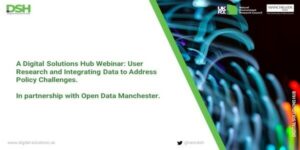
Webinar: User research and integrating data to address policy challenges
• More than 40 people joined our webinar in November, to learn more about our user research and how data on the Hub might be used to inform policymaking.
• Open Data Manchester explained how user engagement workshops were used to identify different types of data user, produce a common data journey, and understand the barriers faced by data users and how they might be overcome.
• We also detailed how the outcomes of the user research helped us to identify the requirements that users would like the Digital Solutions Hub to meet, so that we can build a Hub that offers what users want.
• Finally, we highlighted four use cases which demonstrate how policy makers might benefit from the tools and data stored on the Hub to assist in making evidence-based decisions in areas connected to: housing and environmental constraints, environment and health, flooding and coastal communities, and, urban heat stress.
• If you missed the webinar or want to revisit the presentations and questions asked, then click here.
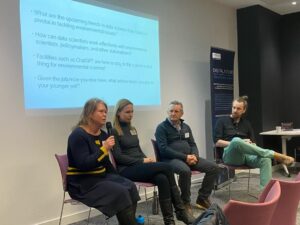
Data Science of the Natural Environment Conference
• The conference, which took place in November, co-hosted by Digital Futures and The Alan Turing Institute, brought together researchers and other stakeholders to share the latest developments at the data science-natural environment interface.
• The conference considered how global climate change, pollution, the move to net-zero and widening economic-social divides were all areas that would benefit from data-driven approaches to mitigate impacts on the environment.
• Professor David Topping, Co-Director of the Digital Solutions Hub, kickstarted the conference and was later joined by our Co-Investigator Professor Maria Sharmina who spoke about how data science can provide powerful tools for facilitating a low carbon economy and the associated trade offs.
• The DSH was also represented by Professor Caroline Jay who joined a panel which considered how data scientists can work effectively with policymakers, environmental scientists, and other stakeholders to convey important messages.
• Learn more about the conference by clicking here.

Christmas Reading
Unwrap the gift of knowledge this festive season by catching up on the DSH articles we released this year.
• Data and decision making: how AI and data tools can help influence evidence-based policy change – Professor Dave Topping
• Determining the impact of poor air quality in cities on daily life: the value of using ‘citizen sensors’ and agile platforms – Professor Caroline Jay
• Spreading like wildfire: the need for a UK Fire Danger Rating System (FDRS) – Dr Gareth Clay
• Artificial Intelligence and future transport and mobility: What do cities want and how can urban planning respond? – Dr Ransford A. Acheampong
• Underground hydrogen storage, the key to a green and sustainable future – Dr Lin Ma and Professor Kevin Taylor
Refer a Friend
We want to reach as many data-users as possible, so please forward this email to colleagues and friends asking them to sign up here, and they too can have early access to the Hub and hear about future events.
Sign up to the newsletter
In this issue, we invite you to join our webinar, in partnership with Open Data Manchester, where we will discuss our user research outcomes and highlight user case examples.
Help us shape the Digital Solutions Hub, by taking part in our user research interviews, which will enable us to effectively address user needs.
Learn about the role of urban planning in the integration of Artificial Intelligence into transport in a new article by Dr Ransford A. Acheampong.
And finally, if you missed our appearance at DataConnect23 why not visit our website to access our slide deck.
As always you can find DSH updates on Twitter and LinkedIn.
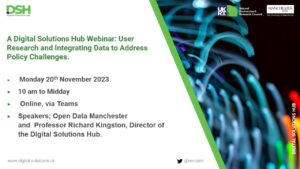
Webinar: User research and integrating data to address policy challenges
Monday 20th November, 10am to Midday, on Teams.
The success of the Digital Solutions Hub relies on the tools, resources, and underlying data meeting the needs of a growing community of potential users.
Join us for a webinar in partnership with Open Data Manchester, where we will discuss the outcomes of our user engagement workshops and how this feeds in to the Development of our Hub.
We also provide user case examples on how the DSH can support policymakers in making evidence-based policy interventions.
Register for the webinar.

Will you give us feedback?
100 people attended our user research workshops last year and this helped us to identify 400 requirements that users would like the Digital Solutions Hub to meet.
To ensure that we are building a Hub that works for you, we will be carrying out in-depth interviews with users to help us prioritise these requirements effectively.
Interviews will be visually interactive and will consider the functionalities and features of the DSH in detail.
If you have attended one of our workshops, events, or are new to the DSH and work with environmental data then we are keen to hear from you.
The interview process will be open until mid December.
Confirm your attendance for an interview by emailing digital-solutions@manchester.ac.uk.

Article: Artificial Intelligence and future transport and mobility: What do cities want and how can urban planning respond?
By Dr Ransford A. Acheampong
- As automated driving technologies are introduced gradually into cities, urban planning has a critical role to play in anticipating the implications of this transition and mediating unwanted consequences for societies.
- Policymakers must recognise and provide opportunities for diverse viewpoints in envisioning and creating desired mobility futures. Crucially – uncertainty cannot lead to inaction.
- Transport and mobility policies and plans must address local needs and strategic imperatives such as meeting Net Zero targets. Engagement and constructive dialogue are key.
Read the article.
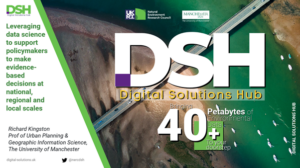
The DataConnect23 Conference Series
On 29th September, more than 120 people from across the public sector logged on to watch Professor Richard Kingston’s Webinar on leveraging data science to support policymakers make evidence-based decisions, as part of the DataConnect23 conference series.
Professor Richard Kingston, Director of the Digital Solutions Hub, outlined the challenges that users of environmental data face and how the DSH might help to overcome them.
He explained how the DSH would allow users to run computationally intensive analysis such as ‘what if modelling’ alongside the building of data visualisations, which could then be used to tell a story about the need for policy change.
If you missed our presentation and would like to find out more, you can access our slides using the button below.
Access our DataConnect23 slides.
Refer a Friend
We want to reach as many data-users as possible, so please forward this email to colleagues and friends asking them to sign up here, and they too can have early access to the Hub and hear about future events.
Sign up to the newsletter.
In this issue, we share Open Data Manchester’s final User Research Report, which outlines what we learned from our stakeholder engagement workshops and the requirements the Digital Solutions Hub (DSH) needs to meet to help you, its users.
Read our new article by Professor Caroline Jay, Co-Investigator of the DSH, on how agile data platforms, can be used to inform clean air policy interventions and monitor their success.
Learn how you can help us shape the DSH, by taking part in our user research interviews, which will help us to ensure we are effectively addressing user needs.
And lastly, join us for an online event where we discuss the data that can be found on the DSH and how policymakers can use it to inform their decision making.
As always you can find DSH updates on Twitter and LinkedIn.
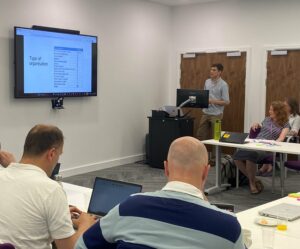
New Report: User Research Report now live
• The success of the DSH programme relies on the tools, resources, and underlying data meeting the needs of a growing community of potential users.
• Workshops, run by Open Data Manchester (ODM), delved into processes, workflows, and workarounds that people employ when using environmental data and sought to understand the challenges and barriers they faced.
• Their research showed that users encountered the most challenges when trying to ‘Get’, ‘Analyse’ and ‘Manage’ data.
• Requirements for the DSH therefore include, but are not limited to: having a sophisticated search function, allowing users to track the work done on datasets, and to influence best practice within the data ecosystem.
Read the Full Report

Determining the impact of poor air quality in cities on daily life: the value of using citizen sensors and agile platforms
By Professor Caroline Jay
• Pollution may be affecting the health of many people who are not visible to the health service as symptoms are not always clinically reported.
• 700 people, or ‘citizen sensors’, who suffer from allergies logged more than 36,000 symptom reports on the ‘Britain Breathing’ app in the 5 years from 2016 to 2020.
• Policymakers should make use of data from ‘citizen sensors’ and agile data platforms which merge a diverse range of environmental and health data, including symptom reports, to inform clean air policy interventions and monitor their success.
Read the article

User Research Interviews: can you help?
As you will have seen from the User Research Report findings, there are a number of requirements that data users would like the Digital Solutions Hub to meet.
To help us ensure we are capturing, addressing, and prioritising user needs effectively, we will be carrying out in depth interviews with users from a variety of key stakeholder organisations in the UK.
Interviews are set to take place in October and November 2023.
If you attended a workshop last winter, then please keep an eye out for an invite to interview.
Alternatively, if you were unable to attend the workshops but are interested in participating in upcoming interviews please email us at digital-solutions@manchester.ac.uk.
Online event: integrating environmental, socioeconomic and health data to address policy
Friday 29 September, 11am to 12pm
• The DSH Team are presenting at DataConnect23 a conference series facilitated by the government’s Central Digital and Data Office and Data Quality Hub.
• DataConnect23 brings together data experts from across central government, local government, devolved administrations, academia and
national institutes to highlight interesting data initiatives and discuss how better data management will enable improved efficiency and public services.
• Join Professor Richard Kingston and Dr Nourhan Heysham as they discuss the data that can be found on the DSH and how policymakers can use it to assist them in making evidence-based interventions, to address the policy challenges they face.
Attend DataConnect23
Refer a Friend
We want to reach as many data-users as possible, so please forward this email to colleagues and friends asking them to sign up here, and they too can have early access to the Hub and hear about future events.
In this issue, we share what we’ve learned from our stakeholder engagement workshops.
You can also read our new article on how AI and data tools like the DSH can be used to influence evidence-based policy change.
And finally, learn about how environmental data can be used to create a Fire Danger Rating System for the UK.
As always you can find DSH updates on Twitter and LinkedIn.

What we’ve learnt – User Research Report
Here at the DSH it is important that we build a facility based on user-need and not their perceived use of technologies.
That is why we worked with Open Data Manchester (ODM) to hold a series of workshops aimed at discovering how environmental data is used and the challenges faced.
ODM have been analysing the results and their full User Research Report will be available to share with you soon.
In the interim you can read some of the key findings below:
Highlights
• Around 100 cross-sector professionals provided feedback.
• 7 user archetypes were identified from the research.
• Considerable overlap in the journeys of different users allowed for the creation of an assimilated user journey.
• The ‘Get’, ‘Analyse’, and ‘Manage’ stages of the journey are where users have encountered the most challenges.
• Requirements for the DSH include, but are not limited to: having a sophisticated search function, allowing users to track the work done on datasets, and to influence best practice within the data ecosystem.
Learn more here

Data and decision making: how AI and data tools can help influence evidence-based policy change
By Professor Dave Topping
• Leveraging data science could be the most effective way for policymakers to make evidence-based decisions in our ever-changing world.
• Available resource, time constraints, security and sustainability are all barriers to the use of data tools in decision making.
• The DSH is attempting to break down the barriers of data driven tools by considering these challenges in its development, so policymakers can access and use data for policy interventions.
Read the article.
Environmental data and policy making
The aim of the Digital Solutions Hub is to allow decision makers to maximise the benefit they get from their environmental data and enhance their abilities to make evidence-based policy interventions.
Over coming months we will be highlighting the types of data that could be available on the DSH and how this might be used to inform decision making.
In this issue, we are highlighting an article written by Dr Gareth Clay, a Reader in Physical Geography, at The University of Manchester. He is currently working on a project to establish and test the scientific underpinning and key components required to build an effective, tailored UK fire danger rating system. Data from this research will sit across NERC’s data centres.

Spreading like wildfire: the need for a UK Fire Danger Rating System (FDRS)
By Dr Gareth Clay
• Fire danger is a combination of different factors, such as weather conditions and fuel type, which can affect the initiation, spread, and ease of controlling a wildfire.
• In England, between 2009/10 and 2020/21 there were around 30,000 vegetation fires each year.
• The Government and governmental agencies should collaborate with researchers to develop a new FDRS for the UK that takes into account fuels that are unique to the UK.
Read the article.
Refer a Friend
We want to reach as many data-users as possible, so please forward this email to colleagues and friends asking them to sign up here, and they too can have early access to the Hub and hear about future events.
The University of Manchester welcomes you to the NERC Digital Solutions Hub newsletter!
In this issue, we explain what the Digital Solutions Hub (DSH) is and how it might help you access and analyse data going forward.
You can read an update on the DSH following our stakeholder engagement workshops.
We introduce you to Professor Richard Kingston, the Director of the Digital Solutions Programme, and we ask if you could be part of our Digital Solutions Hub team.
You can also support the DSH by referring a friend to our newsletter. We want to engage with as many data users as possible, so we can build a hub that really works for you!
You can find regular DSH updates on Twitter and LinkedIn.
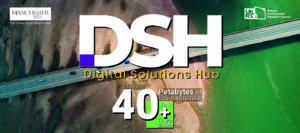
What is the Digital Solutions Hub (DSH)?
The University of Manchester are leading on the Digital Solutions Hub, on behalf of UKRI’s Natural Environment Research Council (NERC).
The DSH will provide a gateway to more than 40 petabytes of NERC’s environmental datasets.
Social, economic, and health data will also be integrated into the system, to make analysis easier.
The DSH will help users to make informed decisions to address the policy challenges they face.
Learn more about the DSH
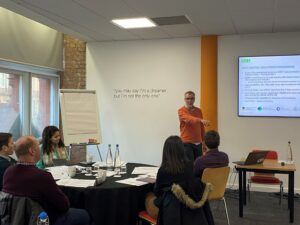
Workshops wrap-up and results webinar
Thank you to everyone who attended one of our stakeholder engagement workshops. The feedback we received will help us to shape the Hub, as we go forward.
We visited 12 cities, across the 4 countries of the United Kingdom and spoke to nearly 200 users of environmental data.
Open Data Manchester, who helped run the workshops, are now analysing the insights you provided to help us map our ‘user personas’ and the features you want to see prioritised on the DSH.
Join us for a webinar on 24 April, to discover our findings from the workshops, by clicking on the link below.

Meet Professor Richard Kingston, Director of the Digital Solutions Programme
As we progress with the DSH, we want you to get to know our team and our backgrounds. Today we are introducing you to our Director, Professor Richard Kingston.
Richard is a Professor of Urban Planning and GISC at The University of Manchester and previously worked in planning practice before joining academia.
He aims to enhance stakeholder involvement and participation in spatial decision making.
Richard’s research brings together: Public Participation GIS, Spatial Analysis and Data Science, and Smart Cities.
Learn more about Richard
Refer a Friend
We want to reach as many data-users as possible, so please forward this email to colleagues and friends asking them to sign up here, and they too can have early access to the Hub and hear about future events.